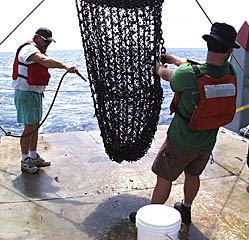|
|
TODAY'S WEATHER
Monster Rocks! There’s an old saying: “Be careful what you wish for - you may get it!” We have wished for lots of good samples of fresh lava from the seafloor. Well, two of our dredges have grabbed “monster” rocks from the Galapagos Rift valley. Each one must weigh about 100 kilograms. Today’s slide show has a photo of one of them. The past day’s sampling work has been very successful, and we have retrieved a variety of lava from the rift valley floor. Some of the lava appears to be old--the glass is not very shiny and has a coating of manganese oxide, which gives it a dull, black-brown color. But other samples we have collected are very glassy and include pillow lava, lobate lava, and sheet lava--some with very interesting textures and shapes. One sample we recovered today looks like it has ledges inside it. These form when some lava inside the chilled outer crust of a newly formed pillow drains out quickly from the center. The lava remaining inside continues to cool and forms horizontal layers of crust inside the outer crust. Then, if the pillow cracks and the rest of the lava spills out, what remains is a lava pillow with the original outer crust and one or more inner shelves of lava--like the sample we collected today. After a day of sampling, we again deployed Argo II to map the area where we had just dredged in central volcano area in the Galapagos Rift valley. As you can probably tell, we are using a combination of data to figure out the best plan for mapping and sampling over the remaining four days. We still have much to do to complete our objectives. This evening, some lucky folks up on the bow of RV Melville were treated to a light show. A meteor flashed close by across the night sky. It was so bright that some people thought that they were being photographed with a flashbulb. Meteors are bits of dust, ice and space rocks that enter Earth’s atmosphere and get vaporized. The vaporization creates the burst of light that we see as shooting stars. These kinds of experiences are the ones that we remember for a lifetime. I remember a night at sea several years ago when the sky was clear and filled with stars. I could trace the path of a satellite hurtling across the entire sky, and for several hours the sky was filled with many shooting stars, or meteors. It was better than Fourth of July fireworks!
|
||||||||||||||||||||||||||||||||||||||||||||||||||||||||||||||||||||||||||||||||||||||||||||||||||||||||||||||||||||||||||||||||||||||||||||||||||||||||||||||||||||
© 2010 Dive and Discover™. Dive and Discover™ is a registered trademark of
Woods
Hole Oceanographic Institution





